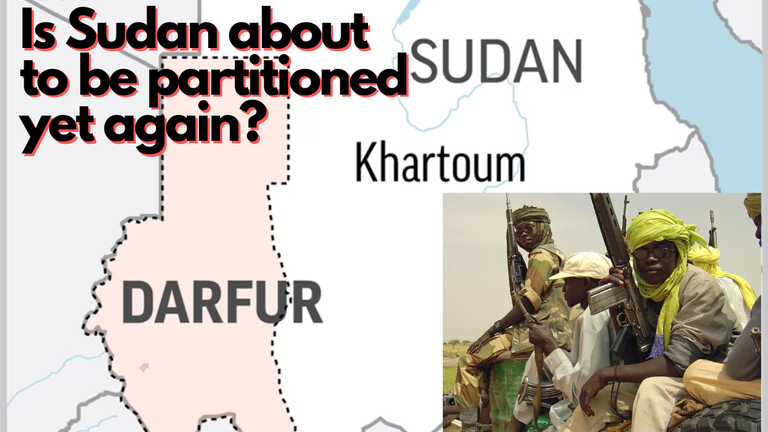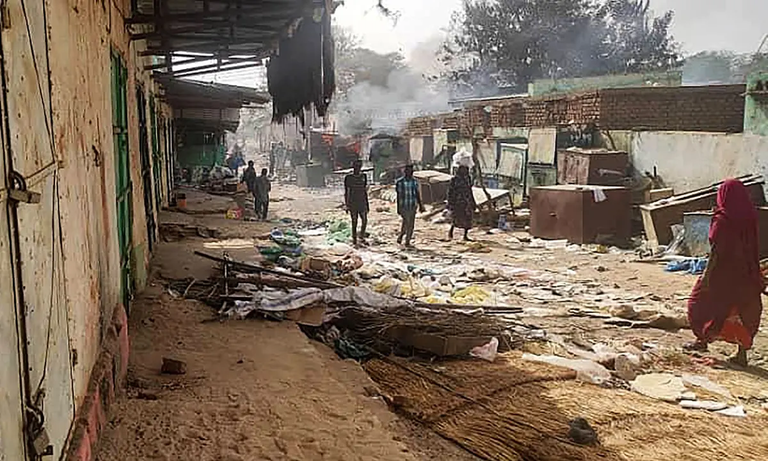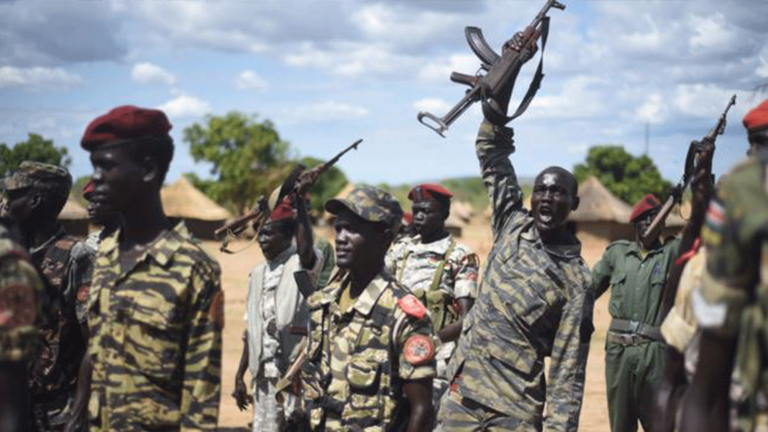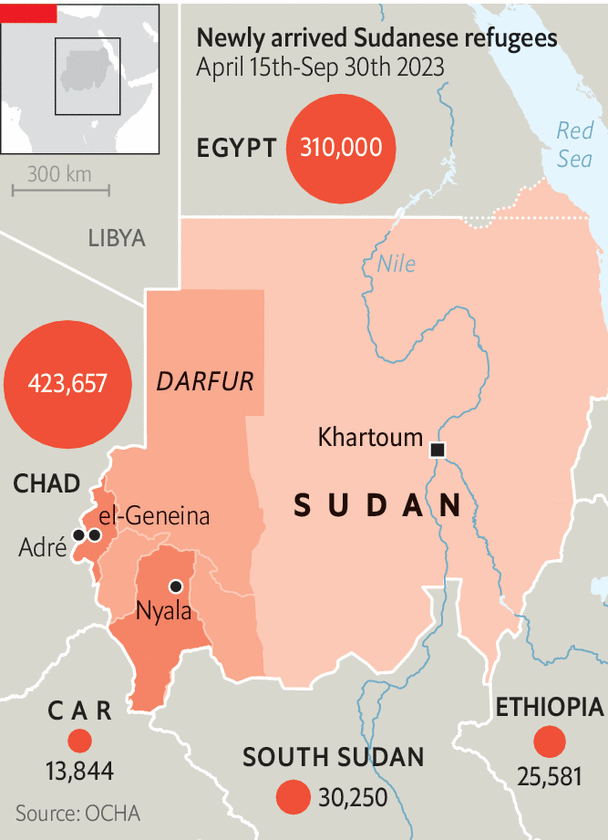
It's been seven months since the war in Sudan began and while media coverage has dwindled with the world's eyes on Israel and Palestine and the West focused on Ukraine's counteroffensive, the consequences of this neglect are alarming. The past few months have seen thousands of deaths and over 2 million people displaced. In early November, paramilitary forces targeted and murdered at least 800 Masalit people in the West Darfur region, with local estimates putting the death toll as high as 1300. An additional 8000 people have fled into neighboring Chad, and this recent escalation in violence risks splitting the country apart yet again. So in this article, we're going to be taking a look at the history of the separatist movement in Darfur, the current ethnic violence unfolding there and consider the possibility that Darfur could succeed in the future.
Let's start with a context that a civil war erupted in April when simmering tensions exploded into open warfare between the Sudanese Armed Forces, or SAF led by General Abdel Fattah Al-burhan and the Rapid Support Forces or RSF, headed by Lieutenant General Mohamed Hamdan Dagalo. Previously, both generals removed a short lived transitional government in a military coup in 2021, which ended the brief attempted transition to democracy following the removal of Sudanese President Omar al-Bashir. This time round though, while fighting began in Sudan's capital, the violence quickly spread to other parts of the country, including the crisis stricken region of Darfur. In June, fighters from the RSF and allied Arab militia attacked the provincial capital of West Darfur, forcing much of the non-Arab population into Chad and other areas of Sudan. Now things got even worse in July, when a mass grave was found with 87 bodies inside, just outside of the city. Then finally, earlier this month, the RSF attacked the town of Ardamata in West Darfur and murdered over 800 Masalit people. These attacks came after the RSF took over a military base in the town and now this recent violence against non-Arab ethnic groups in Darfur is threatening to split the country once more.

So let's take a look at the factors which could lead to a full secession. Firstly, it's worth saying that there are big similarities between what happened in South Sudan and in Darfur, both South Sudan and Darfur have suffered decades of social, cultural, economic and political neglect from the Sudanese government and the ruling elite. By January 2011, after years of civil war, the people of South Sudan voted overwhelmingly for separation from the Republic of Sudan. Now, in the early 2000, there was a similar separatist uprising amongst the non-Arab population in the western region of Darfur. People protested against the Islamification and Arabization policies of al-Bashir's government, which divided people between Arabs and Zurka, that's Non-arabs or Africans. Now, in this instance, al-Bashir quickly employed the Arab militias in Darfur to shut down the process, and the most notable group here were the Janjaweed, an Arab militia that then became the Rapid Support Forces when they were folded into the Sudanese military in the mid 2010s. Ultimately, this led to a terrible campaign of ethnic cleansing against Darfur's Non-arabs, with an estimated 300,000 civilians killed between 2003 and 2005.
These events ultimately led to the formation of the Darfur Liberation Movement, which later became the Sudan Liberation Movement, or SLM, and the Justice and Equality Movement. Now, the SLM and JLM claim to represent the oppressed groups within Sudan and want a radical constitutional reform to grant Sudan's regions greater autonomy. Now, despite the major similarities here, it's important to recognize the demographic difference between South Sudan and Darfur. While neither region is majority Arab, unlike Sudan, Darfur has a predominantly Muslim population. In this respect, it's more culturally similar to the rest of Sudan than Christian South Sudan was, and separatist sentiments were arguably stronger in South Sudan as a result. For instance, the JLM's political manuscript Black Book outlines its rebellion as a fight for social and political integration and economic development rather than for separation. But basically, despite this religious difference with South Sudan, Darfur's non-Arab populations are still being targeted in 2023, and it's not hard to imagine that these calls for integration by rebel groups could quickly turn into calls for separation.

Now, the next reason that Darfur could secede is that peace looks increasingly unlikely. Previous attempts at peace agreements such as the Darfur Peace Agreement in 2006 and the Doha Document for Peace in Darfur in 2011, have not led to a permanent resolution and if this conflict persists or is prolonged over a longer period of time, then the secession of Darfur will only become more and more likely. Currently, multiple ceasefires in the Sudan conflict have failed due to the fact that both the Sudanese Army and the RSF believe in their potential victory and have instead used ceasefires just to rearm. In short, neither side seems ready to end this deadly conflict, which is now entering its eighth month. Moreover, competing diplomatic incentives led by various entities including the US, Saudi Arabia, African Union, IGAD, Kenya and Egypt further complicate this situation. And while diplomatic talks have started, the violence has continued. Unless the international community can get on the same page with a solid peacekeeping strategy and let's be real, that seems unlikely. The other option seems to be tackling peacekeeping efforts in different parts of Sudan, one at a time and crossing fingers that peace will stick in at least one area. This, however, treating different regions differently, could potentially increase calls for break up.
Finally, the last reason that Darfur could secede is the ongoing genocide and ethnic cleansing of its population. That's because the November targeted killings have raised concerns of a return to the atrocities that we witnessed in the early 2000, and the UN High Commissioner for refugees explicitly warned about a similar violent dynamic unfolding parallel to the genocide during the war in Darfur. Already about 6.3 million people have been displaced since April alone. Even the JLM and SLM rebel groups have joined the Sudanese Armed Forces to protect civilians against atrocities, despite both having tense relations with the Sudanese authorities ordinarily, and while secession isn't a direct outcome to genocide, historical examples such as the Rwandan genocide and the breakup of Yugoslavia demonstrate that genocide eventually led to a strong desire for secession. Nonetheless, as things stand, break up looks unlikely in the near future, given that the Sudan authorities still have a monopoly on force and are unlikely to agree to secession.

And the Sudanese government has been resistant to granting significant autonomy or independence to the region, as well as other peripheries around the country. Furthermore, there is no unified movement in Darfur currently, which certainly isn't helping the cause. All in all, while historically Darfurian separatist sentiments haven't been as strong as that of South Sudan, this new wave of ethnic cleansing and the campaign of mass killing could change that. And pressure from other peripheries, which have a stronger armed movement known as Sudan's People's Liberation Movement, could further influence Darfurian separatism. Ultimately, a lot of this depends on the response of the international community and peace talks, which unsurprisingly doesn't seem to be progressing positively at the moment.
Source of potential text plagiarism
Plagiarism is the copying & pasting of others' work without giving credit to the original author or artist. Plagiarized posts are considered fraud. Fraud is discouraged by the community.
Guide: Why and How People Abuse and Plagiarise
If you believe this comment is in error, please contact us in #appeals in Discord.